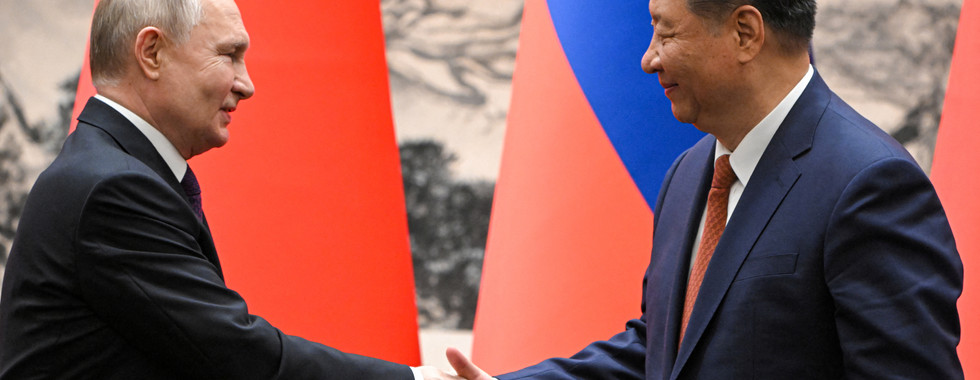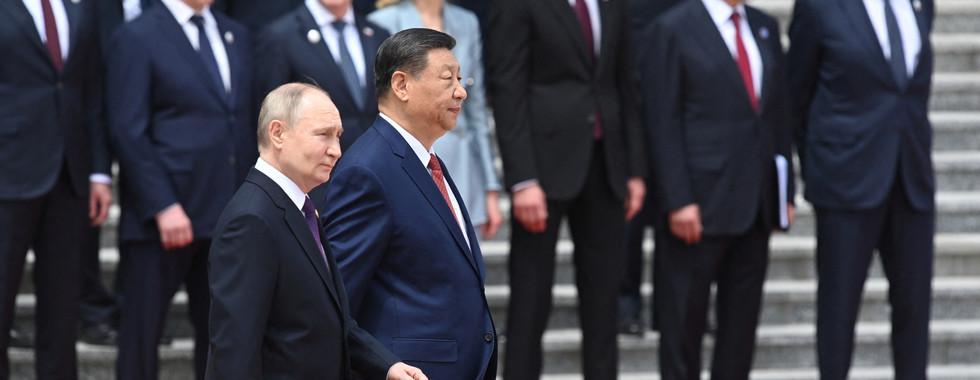Putin and Xi pledge a new era and condemn the United States
- News Agency
- May 16, 2024
- 4 min read

BEIJING/MOSCOW - China's Xi Jinping and Russia's Vladimir Putin on Thursday pledged a "new era" of partnership between the two most powerful rivals of the United States which they cast as an aggressive Cold War hegemon that was sowing chaos across the world.
Xi greeted Putin on a red carpet outside the Great Hall of the People in Beijing, where they were hailed by marching People's Liberation Army soldiers, a 21-gun salute on Tiananmen Square and children waving the flags of China and Russia.
China and Russia declared a "no limits" partnership in February 2022 when Putin visited Beijing just days before he sent tens of thousands of troops into Ukraine, triggering the deadliest land war in Europe since World War Two.
Xi, 70, and Putin, 71, signed a joint statement on Thursday about the "new era" that proclaimed opposition to the United States on a host of security issues and a shared view on everything from Taiwan and Ukraine to North Korea and cooperation on new peaceful nuclear technologies and finance.
"The China-Russia relationship today is hard-earned, and the two sides need to cherish and nurture it," Xi told Putin.
"China is willing to ... jointly achieve the development and rejuvenation of our respective countries, and work together to uphold fairness and justice in the world."
Putin and Xi share a broad world view which sees the West as decadent and in decline just as China challenges U.S. supremacy in everything from quantum computing and synthetic biology to espionage and hard military power.
Xi and Putin believe the post-Cold War era of extraordinary U.S. dominance is crumbling after the perceived humiliations of the 1991 Soviet collapse and centuries of European colonial dominance of China.
The United States casts China as its biggest competitor and Russia as its biggest nation-state threat, while U.S. President Joe Biden argues that this century will be defined by an existential contest between democracies and autocracies.
The U.S. views both as authoritarian rulers who have quashed free speech and exerted tight control at home over the media and the courts. Biden has referred to Xi as a "dictator" and has said Putin is a "killer" and even a "crazy SOB". Beijing and Moscow have scolded Biden for the comments.
WEST VERSUS XI AND PUTIN?
Putin's visit comes weeks after U.S. Secretary of State Antony Blinken flew into China to raise concerns about what he said was China's support for Russia's military.
Blinken's China trip appears to have been an unsuccessful attempt to undermine Xi's deepening relationship with Putin.
By picking China for his first foreign trip since being sworn-in this month for another six-year term, Putin is sending a message to the world about his priorities and the strength of his personal ties with Xi.
The joint statement was described as deepening the strategic relationship and spoke specifically of how cooperation in the defence sectors between the two nations improved regional and global security and of plans to step up military ties.
It singled out the United States for particular criticism.
"The United States still thinks in terms of the Cold War and is guided by the logic of bloc confrontation, putting the security of 'narrow groups' above regional security and stability, which creates a security threat for all countries in the region," the joint statement said. "The U.S. must abandon this behaviour."
It also condemned initiatives to seize assets and property of foreign states, a clear reference to Western moves to redirect the profits from frozen Russian assets or the assets themselves to help Ukraine.
UKRAINE
After the West imposed the most severe sanctions in modern history on Moscow due to the war in Ukraine, Putin pivoted Russia towards China.
Beijing, once the junior partner to Moscow in the global Communist hierarchy, remains by far the most powerful of Russia's friends - and its top buyer of crude.
That closeness has perturbed some in the Russian elite who fear that Russia is now too dependent on China, with which the Soviet Union came to the brink of war in 1969 over a border dispute.
Xi said both sides agreed that a political settlement to the Ukraine crisis was the "right direction" and the joint statement said both countries were opposed to a drawn out conflict.
Putin, who arrived on Thursday for a two-day visit, said he was grateful to China for trying to solve the Ukraine crisis, adding that he would brief Xi on the situation there, where Russian forces are advancing on several fronts.
Describing his initial talks with Xi as "warm and comradely", he outlined sectors where the two countries were strengthening ties, from nuclear and energy co-operation to food supplies and Chinese car manufacturing in Russia.
Informal chats between the leaders and senior officials of both sides to be held over tea and dinner later on Thursday are expected to be key to the two-day trip.
One notable absence from the Putin delegation was Gazprom CEO Alexei Miller, who was holding talks with Iranian officials.
Putin and Xi will participate in a gala celebration marking 75 years since the Soviet Union recognised the People's Republic of China, which Mao Zedong declared in 1949.
It was not immediately clear if Putin would make any more stops in Asia after China.
Source: Reuters























.png)








Comments